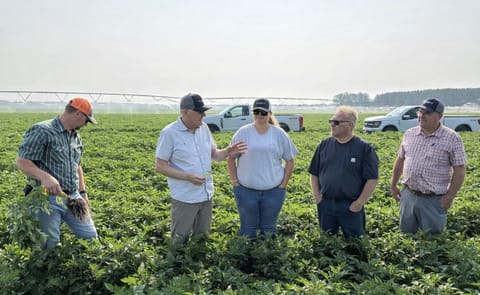Potato field in Pennsylvania naturally infected with late blight, September 2014. Only surviving plants are Innate™ generation two (Courtesy: J.R. Simplot)
主标签
USDA Deregulates Second Generation Innate™ GMO Potatoes

The J.R. Simplot Company is pleased that the USDA has deregulated the Russet Burbank variety of the second generation of Innate™ potatoes. Simplot is looking forward to the completion of the EPA registration and FDA consultation before the second generation of Innate™ potatoes can be introduced into the marketplace.
Related APHIS-USDA documents
- USDA Announces GE Potato Deregulation
- Federal Register Notice: Determination of Nonregulated Status The Federal Register notice will publish on September 2, 2015.)
- Additional documents related to the J.R. Simplot Late Blight Resistant, Low Acrylamide Potential, Reduced Black Spot Bruising, Lowered Reducing Sugar GE Potato
The second generation of Innate™ potatoes contains four beneficial traits of relevance to potato growers, processors and consumers:
- Reduced bruising and black spots;
- Reduced asparagine;
- Resistance to Late Blight pathogens (Phytophthora infestans); and
- Enhanced cold storage capability. These traits were achieved by adapting only genes from wild and cultivated potatoes.
Early research shows that Innate™ second generation potatoes will further contribute to reducing waste associated with bruise, blight and storage losses by reducing waste at multiple stages of the value chain, including in-field, during storage, processing, and in foodservice. That research suggests that these traits will translate to less land, water and pesticide applications to produce these potatoes.

Comparison of peeled Innate™ Russet Burbank (foreground) to conventional peeled Russet Burbank after 30 minutes.
Academics consulted by Simplot, for instance, estimate that the Innate™ late blight resistance trait, regulated by the EPA, can result in a 25-45% reduction in fungicide applications annually to control late blight. Lower asparagine means that accumulation levels of acrylamide can be reduced by up to 90% or more when these potatoes are cooked at very high temperatures. In addition, lowered reducing sugars enable cold storage at 38°F for more than 6 months without the build-up of sugars which improves quality.
Impact EPA regulation
The second generation Innate potatoes remain regulated as Plant-Incorporated-Protectants by United States Environmental Protection Agency (EPA), and no promotion, distribution or sale of these potatoes is allowed until they are registered by the EPA:
These Innate™ potatoes express a gene that makes them resistant to certain strains of the late blight pathogen. The Environmental Protection Agency classifies genes that confer disease resistance to be Plant Incorporated Protectants and therefore they are regulated as unregistered pesticides. Hence, commercialization of Simplot's second generation of Innate™ potatoes is dependent on the successful completion of the regulatory process.









